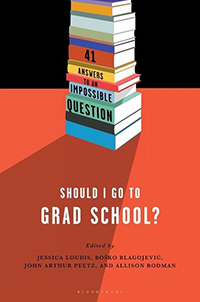Should I Go to Grad School: 41 Answers to an Impossible Question (Bloomsbury, 2014) is probably not a useful book for you if you’re considering going to graduate school. On the other hand, if you’re already in grad school, or you’ve completed it, or dropped out, or never went and, crucially, are now happy in whatever career you are in – then you will find much to delight you in this collection. It is a series of 41 essays by extremely accomplished people, mostly American, who are enjoying successful lives as academics, authors, filmmakers, broadcasters, poets and cocktail inventor-consultant.

The introduction notes that the book is about deciding whether to go on to master’s programs in English, history, art or poetry and doctoral degrees the humanities, cultural studies and social sciences. It isn’t really about the appropriateness of grad school from an economic perspective, writes lead editor, Jessica Loudis. Rather, “it’s about what drives people to consider going back to school in the first place, the point at which rational choice intersects with personal predilection, unpredictable circumstances, and anxiety about the future.”
The first chapter by Stephen Burt, a professor of English at Harvard, is constructed like one of those self-help magazine quizzes – he calls it a “choose-your-own-not-so-adventurous-adventure” – that lead you to different endings depending on each answer you provide. If you answer yes to question number 5, “Are you willing to teach college students, correct their writing, and work on how they learn for five or six years, making only whatever the normal graduate stipend in your field is, while also researching and writing a book?” then you move to question 11; if you answer no, go to question 10.
Stephen Squibb, one of the few students represented in this volume, begins his essay by saying flatly that it probably isn’t a good idea to get a PhD in the humanities. But he is in fact getting one, and he explains why it turned out to be the right decision for him– most importantly because he is “learning that I love to teach.”
Many of the essays seem to address the topic head-on, but then veer off into stories of the author’s own circuitous route to their current stage in life. Eben Klemm didn’t get a PhD but did spend three years working at a lab at the Whitehead Institute at MIT, where he loved the rampant curiosity, the esprit de corps, even the work. But he discovered that unlike his colleagues, “I didn’t have one thing I wanted to spend my entire life thinking through.” So academia wasn’t for him. He is now an unbelievably successful mixologist (someone who creates cocktails), flying around the world giving talks and creating custom cocktails for new restaurants.
There is very little if any anger in this book about wasted years, wrong decisions and bad advice. Some writers remember their programs fondly, even though they’re doing something unrelated now. Others dropped out or didn’t go to grad school and are happy about that decision, too.
The reason I don’t think the book would help the average student deciding whether to go to grad school is precisely because the authors are so talented. I doubt that their situations resemble the average student’s when deciding whether to apply, or when feeling stuck in a graduate program and unsure what to do next.
One of my favourite essays in the collection may illustrate what I mean. Amy O’Leary was 24, working for a software company in Saint Paul, Minnesota. Her dream had been to write for the New York Times, and now her life felt like a dead end. Maybe grad school was the answer?
She occasionally spent time at Barnes & Noble, thumbing through the self-help section. “Like a gift,” a book came into view with the title: I Could Do Anything If I Only Knew What It Was. She bought the book, and it helped her settle on a goal, something so worth striving for that she might actually fail at it: to become a producer for the public radio program This American Life. She gave herself five years and began to research how she could do this. She was so thorough, it might seem to the reader that she already had graduate-level experience in how to do research):
“I studied every producer the show had ever hired and discovered that nearly 10 percent of them had been interns there. I researched every intern whose name was mentioned in the program’s credits and discovered that nearly 10 percent of them had gone to a four-month-long radio training program in Maine.”
She applied to the program, was accepted, moved to Portland, Maine, then to New York. She studied every episode of the show and spent “a full year” working on her internship application. To make a short story even shorter, after interning and working for This American Life, she eventually was hired as a reporter for the New York Times where, at the time of publication, she was still working.
Perhaps, though, I’m being too cynical. For the right student, on the cusp of a decision, perhaps Ms. O’Leary’s story will be exactly the answer they are seeking. And, for everyone else, if you enjoy well-written personal essays, you’ll like this book very much.